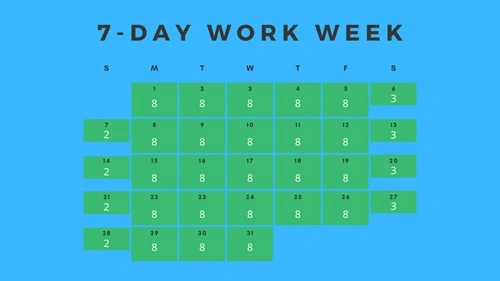No, it is not inherently illegal to work 7 days a week in the United States, but labor laws at the federal and state levels regulate work hours, overtime pay, and rest periods to protect workers. While federal law under the Fair Labor Standards Act (FLSA) does not mandate days off, some states have specific statutes that limit the number of consecutive days an employee can be required to work.
Federal Regulations
The Fair Labor Standards Act (FLSA) governs wages, overtime, and working conditions but does not require employers to provide rest days or limit consecutive workdays for most employees. However, it does include provisions to ensure fair compensation:
1. Overtime Pay: Employees who work more than 40 hours in a workweek must receive overtime pay at a rate of at least 1.5 times their regular hourly wage.
2. Rest Periods: The FLSA does not require employers to provide rest or meal breaks. However, if breaks are provided and last 20 minutes or less, they must be paid.
State Laws on Working 7 Days a Week
Several states impose additional restrictions or protections regarding consecutive workdays:
- California
- California Labor Code Section 551 states that employees are entitled to one day of rest in every seven-day workweek.
- Section 552 prohibits employers from causing employees to work more than six days in a row. However, exceptions apply to part-time employees and specific industries.
- Voluntary work on the seventh day is allowed if the employee consents and receives proper overtime pay.
- New York
- New York’s labor laws require a day of rest for certain industries, such as manufacturing and mercantile businesses.
- Illinois
- The One Day Rest in Seven Act (ODRISA) mandates that employees receive at least 24 consecutive hours of rest in every seven-day period, with exceptions for emergencies and certain jobs.
- Texas and Florida
- These states follow federal FLSA guidelines without additional regulations for rest days.
Exceptions to the Rules
Certain workers are exempt from rest-day laws or overtime protections:
1. Exempt Employees: Salaried employees in executive, administrative, or professional roles often fall under FLSA exemptions and are not entitled to overtime pay.
2. Unionized Workers: Collective bargaining agreements may include specific provisions for work schedules and rest days, overriding state or federal laws.
3. Emergency or Essential Workers: Employees in industries such as healthcare, public safety, and transportation may be required to work extended or consecutive days during emergencies.
Voluntary vs. Mandatory Work
- Voluntary Work: Employees can choose to work 7 days a week if they agree to the schedule and receive proper overtime pay.
- Mandatory Work: Employers cannot coerce employees into working 7 days a week without providing legally required rest periods in states with applicable laws.
Potential Legal Consequences for Employers
Employers who violate rest-day or overtime laws may face:
1. Fines: State labor departments can impose penalties for non-compliance with rest-day statutes.
2. Lawsuits: Employees may file lawsuits for unpaid wages, overtime violations, or unfair labor practices.
3. Investigations: Repeated violations can trigger investigations by state or federal labor agencies.
Worker Rights and Recommendations
1. Understand State Laws: Workers should familiarize themselves with the labor laws in their state to know their rights regarding rest periods and overtime pay.
2. Document Hours Worked: Keeping accurate records of hours worked ensures proper compensation and provides evidence in case of disputes.
3. Report Violations: Employees can report labor law violations to their state’s labor department or the federal Department of Labor (DOL).
Related FAQs
Q1. Can my employer make me work 7 days in a row?
Ans: It depends on the state. Some states, like California and Illinois, require a day of rest in every 7-day work period. In other states, this may be legal as long as overtime pay is provided.
Q2. Is working 7 days a week bad for my health?
Ans: Prolonged work without rest can lead to burnout, stress, and physical health issues. It is essential to balance work with adequate rest.
Q3. Do I have to work 7 days if I’m exempt from overtime laws?
Ans: Exempt employees may be required to work extended hours, including 7 days a week, depending on their role and employment agreement.
Q4. What should I do if my employer doesn’t give me a rest day?
Ans: Contact your state labor department or file a complaint with the U.S. Department of Labor for potential labor law violations.
Q5. Are there industries where working 7 days is common?
Ans: Yes, industries such as healthcare, hospitality, and agriculture often have employees working extended or consecutive days, sometimes with exemptions under state or federal laws.
Conclusion
While it is not universally illegal to work 7 days a week, state-specific laws and industry regulations may require employers to provide rest periods or overtime compensation. Workers should familiarize themselves with federal and state labor laws to understand their rights and ensure compliance from their employers. Proper enforcement of labor laws helps maintain a balance between productivity and employee well-being.


